“The writing teacher’s ministry is not just to the words, but to the person who wrote the words.” William Zinsser
“It must be tough looking at a very large stack of papers, but it is the most helpful part of the essay process because without a reader the whole process is diminished.”
Alexandra Hays, college student
Our collective interest in responding is deeply professional and personal. We feel a weighty responsibility in responding to our students’ words, knowing that we, too, have received comments that have given us hope—and sometimes despair—in our abilities as writers. The words teachers scribbled on our papers are often the same words we scribble in the margins or at the bottom of our own students’ pages. These words, we hope, our students will take with them as they move from our class to the next, from one assignment to another, across the drafts. Responding to student writing reminds us of the pleasures of teaching writing, the call and response between our students’ words and our own. Yet most of us acknowledge that we don’t know how students use our comments or why they find some comments useful and others not.
In this workshop, we will engage with the words and ideas of one student writer. We’ll read the student’s draft and reflect on what it means to be a thoughtful reader of this student’s work. We will be asking questions such as:
- What lessons do students learn from comments?
- What distinguishes comments to inspire revision from comments to assess a final draft?
- And how do we engage students in a dialogue about their drafts?



